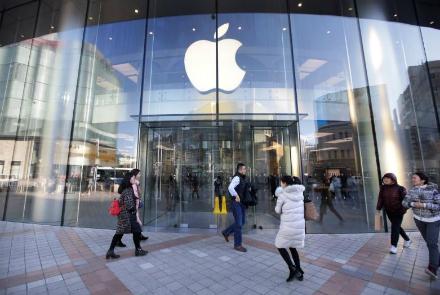Apple Inc on Wednesday took the rare step of cutting its quarterly sales forecast, with Chief Executive Tim Cook blaming slowing iPhone sales in China, whose economy has been dragged down by uncertainty around US-China trade relations.
The news, which comes as a spotlight grows on Beijing’s attempts to revive stalling growth, sent Apple shares tumbling in after-hours trade, hammered Asian suppliers and triggered a broader selloff in global markets.
The revenue drop for the just-ended quarter underscores how an economic slowdown in China has been sharper than many expected, catching companies and leaders in Beijing off balance and forcing some to readjust their plans in the market.
“While we anticipated some challenges in key emerging markets, we did not foresee the magnitude of the economic deceleration, particularly in Greater China,” Apple CEO Tim Cook said in a letter to investors.
Apple finds itself in a tricky position in China, a key market for sales and where it manufactures the bulk of the iconic products it sells worldwide, after the high-profile arrest in Canada of the CFO of domestic rival Huawei Technologies Co Ltd [HWT.UL].
Since the arrest last month, at the request of the United States, there have been sporadic reports of Chinese consumers shying away from Apple products. Even before then, local rivals like Huawei had been gaining market share over Apple.
Cook told CNBC that Apple products have not been targeted by the Chinese government, though some consumers may have elected not to buy an iPhone or other Apple devices due to the firm being an American brand.
“The much larger issue is the slowing of the (Chinese) economy, and then the trade tension that has further pressured it,” Cook said.
PRICE TAG
Some analysts, however, questioned the impact of Apple’s own actions, such as its unyielding pursuit of high selling prices for its products.
“Apple sales in China have not been doing well for a few quarters now, part of the reason is that their price points have gone too high - past the $1,000 mark,” said Kiranjeet Kaur, an analyst at market research firm IDC.
“(That’s) almost three times as expensive as phones from other vendors that are filling the mass market.”
China’s smartphone market has dropped sharply this year, with Apple and South Korean rival Samsung Electronics Co Ltd leading the fall, even as some domestic peers have performed more strongly.
(Apple, Samsung lead China smartphone drop: tmsnrt.rs/2PdBGNw)
Samsung said last month it would cease operations at one of its mobile phone manufacturing plants in China, after seeing its share of the Chinese market drop to 1 percent in the first quarter of 2018 versus 15 percent in mid-2013.
FORECAST CUT
Apple on Wednesday lowered its forecast to $84 billion in revenue for its fiscal first quarter ended Dec. 29, below analysts’ estimate of $91.5 billion, according to IBES data from Refinitiv. Apple originally forecast revenue of between $89 billion and $93 billion.
This marked the first time Apple had issued a warning on its revenue guidance ahead of releasing quarterly results since the iPhone was launched in 2007.
Apple shares skidded 7.7 percent in after-hours trade, dragging the company’s market value below $700 billion. In the broader market, the S&P 500 futures fell 1.5 percent. In the U.S. government bond market, a typical safe-haven, the yield on the benchmark 10-year, which moves inversely to the bond’s price, sank to an 11-month low.
PRECURSORS TO A WARNING
Apple’s move was not entirely a surprise. In November, the Cupertino, California-based company said it would quit disclosing unit sales data for iPhones and other hardware items, leading many analysts to worry that a drop in iPhone sales was coming. And after several component makers in November forecast weaker-than-expected sales, some market watchers called the peak for iPhones in several key markets.
In November, Cook cited slowing growth in emerging markets such as Brazil, India and Russia for lower-than-anticipated sales estimates for the company’s fiscal first quarter. But Cook specifically said he “would not put China in that category” of countries with troubled growth.
Hyundai flags tough 2019 as US, China demand stays slow
That all came before the damage to the Chinese economy from trade tensions with the United States and long-simmering structural issues became evident.
Apple is now the highest-profile multinational corporation to warn that the economic slowdown in China could hurt its business. Automakers such as Ford Motor Co, Hyundai Motor Co and Nissan Motor Co Ltd all previously said they planned to cut production in the country.
But Apple has held firm on its premium pricing strategy in China despite the risk of a slower economy.
“The question for investors will be the extent to which Apple’s aggressive pricing has exacerbated this situation and what this means for the company’s longer-term pricing power within its iPhone franchise,” James Cordwell, an analyst at Atlantic Equities, told Reuters.
In the latest fiscal year, ended Sept. 29, unit sales of the iPhone were essentially flat from the prior year, while iPhone revenue expanded 18 percent to $166.7 billion. That growth came entirely from higher prices.
Hal Eddins, chief economist at Apple shareholder Capital Investment Counsel, said Cook’s comments on the impact of the US trade tensions with China “might be a dig at Trump, but mostly he may be using the trade turmoil as an excuse for some missteps they’ve made over the last year.”
But some investors were heartened by Apple’s plans on using its cash pile.
In his letter, Cook said Apple has $130 billion in net cash and that it intends to continue its efforts to reduce that cash balance to net zero, which the company has so far accomplished through dividend increases and share buybacks.
“We would anticipate the company increasing share buybacks on the weakness to return capital to shareholders at discount prices,” said Trip Miller, managing partner at Apple shareholder Gullane Capital Partners.

